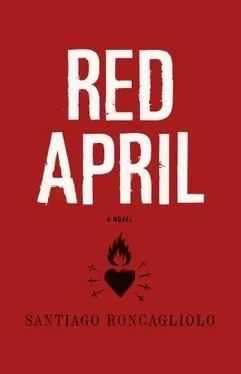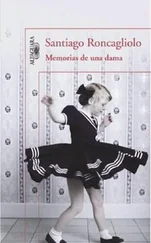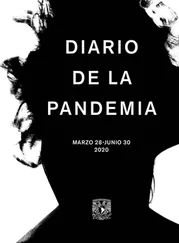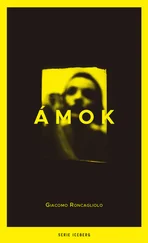It was the last straw. Now the best allies of the terrorists were the police. But there was still something that did not fit:
“And Durango escaped in order to die?”
“Maybe they're the ones who killed him.”
“If you had seen the faces of the police when they found the body, you would not say that.”
“That's another problem. I only know what I'm telling you. And remember, I haven't told you anything.”
The light flickered. The doctor was right. It really was another problem. But it was the principal problem. All the victims seem to have gone directly, almost willingly, to their murder. With Mayta and Durango it was reasonable. They trusted their comrades, they went along. The first one, Cáceres, also had an explanation: he was hopelessly mad, mad with blood. People who have killed too much never recover. It doesn't matter which side they did it for.
The doctor made a general description of the wounds: hematomas on the shoulders and bruises that indicated a strenuous struggle before being nailed up. Muscular lacerations resulting from long nails in the extremities. Chacaltana did not listen. He barely noticed the mixture of liquids that ran from the wounds. The red of blood and something greenish black: he had no idea what it could be. And he did not ask. He was lost in his own thoughts.
He left the hospital plunged into dark nausea. A crowd had gathered around the bishop of Huamanga, who performed the traditional washing of the twelve beggars. The prosecutor had the report to deliver to Carrión. As he passed through headquarters, he asked himself what in hell he was going to tell him. That he had no idea about anything, that the terrorists were still at large, that he had no more theories, that he had never had any theories. He realized that his eyes were filling with tears. He thought about what his mother would have done in this situation. He decided to leave the report at reception and continue on to the Church of the Heart of Christ. He found Father Quiroz about to leave. Father Quiroz was always about to leave. When the prosecutor appeared, he greeted him with a smile that barely disguised his annoyance.
“Today I really am sorry, Señor Prosecutor, but it's Holy Thursday and, as you can understand, I cannot attend to you. Besides, these aren't working days. Why don't you continue your investigation on Monday?”
“I have not come to investigate, Father.”
“Ah, no?”
“I have … come to confess.”
“Well, perhaps that can wait too. God will understand.”
The priest looked toward the door, where two nuns were waiting for him. He looked at his watch. The prosecutor said:
“There's a new corpse.”
The priest began to lead him slowly by the arm to the door as he listened to him.
“I'm sorry. How did he die?”
“You don't even want to know. But I know who killed all of them.”
“Are you serious?”
The priest did not seem to be listening carefully. He appeared lost in his own thoughts.
“It was me,” said the prosecutor.
The priest turned pale. He seemed to stop breathing. As if to recuperate, he sighed deeply and turned toward the nuns at the door. With a gesture he told them to continue on their way. They seemed disappointed but submissive. Then, Quiroz took the prosecutor to a confessional and each of them took his place. The prosecutor kneeled when he heard the confessor's screen move and said:
“I don't know how to do this, Father. I haven't confessed for a long time.”
The priest quickly whispered some formulas that Chacaltana could not make out. Then he said:
“Just tell me. We're not going to give you an intensive course on the sacraments now.”
The prosecutor swallowed. He looked at the Baroque images in the church, the red candles at each altar, before he said:
“All the people I talk to die, Father. I'm afraid. It's … it's as if I were signing their death sentences when I leave them.”
“My son,” said the priest. Suddenly Chacaltana had stopped being Señor Prosecutor. “Perhaps … perhaps you are carrying too much … These deaths aren't your fault.”
“I'm afraid. I don't sleep well. This … all of this is as if I had already seen it. There's something in all this that has already happened, something that speaks of me. Do you understand? You don't understand, do you?”
“My son, the terrorist madness knows nothing of reasons or feelings. If you allow yourself to be morally destroyed by them, you're letting them win. That's what they want. For you to collapse. Then their work will be easier.”
Tears escaped again from the prosecutor's eyes:
“I've seen things … Things you cannot imagine. They …”—he had just noticed how hard it was for him to say it—“they tear off limbs … They cut off arms and legs …”
“Don't underestimate me, my son. I also fought. I know what you know. I know them.”
“Why, Father? Why can't they simply kill? Why does it have to be like this?”
“There is a reason beyond barbarism.” The priest's paternal warmth was congealing into a serious, dry tone. “In the Andes there is the myth of Inkarri, the Incan King. It seems to have emerged during colonial times, after the indigenous rebellion of Tupac Amaru. After suppressing the rebellion, the Spanish army tortured Tupac Amaru, they beat him until he was almost dead …”—blows, blows, blows, thought the prosecutor—“then they attached his limbs to horses until he was pulled to pieces.”
The images of Tupac Amaru quartered followed one another in the mind of the prosecutor as if he had experienced them. His mother had told him the story once, in Cuzco, the city that the chief had besieged and where he had been killed. The prosecutor's mother was Cuzcan. The priest continued:
“The Andean campesinos believe that the parts of Tupac Amaru were buried in different places throughout the empire so that his body would never join together again. According to them, those parts are growing until they can rejoin. And when they find the head, the Inca will rise again and a cycle will be closed. The empire will rise again and crush those who bled it. The earth and the sun will swallow the God the Spaniards brought in from outside. At times, when I see the Indians so submissive, so ready to accept anything, I wonder if on the inside they aren't thinking that the moment will arrive, and that someday our roles will be reversed.”
“What does Sendero Luminoso have to do with that?”
“A great deal. Sendero presented itself as the resurgence. And it was always conscious of the value of symbols. They killed a woman and blew up her body with explosives to shatter her into pieces. In this way, her parts will never unite again. Her resurrection was made impossible.”
“Against whom are we fighting, Father? They're everywhere and at the same time they're not. They're invisible. It's like fighting ghosts.”
“It's like fighting the gods we don't see. Perhaps we're fighting the dead.”
They remained in silence for a few minutes. Suddenly, Quiroz seemed to remember something:
“When did they kill the last one?”
“Last night, almost at dawn, after the procession of the Meeting.” The prosecutor felt relieved at having spoken with the priest, but exhausted, as if he had lost all his breath in the conversation. He sighed. “There was no special security. We had deployed it for Palm Sunday, and even Monday, but more could not be justified.”
The priest thought for a moment and said:
“There's … another Andean myth that perhaps you ought to know about. In general, beginning on the night of Holy Wednesday, the Indians abandon themselves to the most … sinful celebrations. Torrents of alcohol flow, and a good deal of sex, and usually there are violent incidents. It goes on until Resurrection Sunday.”
Читать дальше












